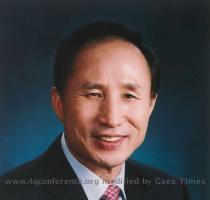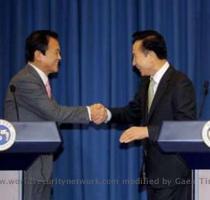North Korea asks rival South for rice, cement and heavy equipment for flood recovery
By Hyung-jin Kim, APTuesday, September 7, 2010
NKorea asks South for flood aid despite tension
SEOUL, South Korea — North Korea requested a shipment of rice, cement and heavy equipment days after rival South Korea offered relief aid to its communist neighbor to help it recover from recent flooding, Seoul’s Unification Ministry said Tuesday.
Word of the communication between the two Koreas on aid came a day after the North announced it would release the crew of a seized South Korean fishing boat, in a sign that the divided countries may be talking behind the scenes in what could lead to a resumption of formal talks.
Tensions between the two countries, which are still technically in a state of war, have been exceptionally high in recent months following the sinking of a South Korean warship that Seoul blamed on Pyongyang. North Korea denies the charge and has threatened retaliation if it is punished.
But South Korea has in the past served as a lifeline to the desperately poor North, which struggles to feed many of its 24 million people in the best of times.
An overflowing river last month swamped farmland, houses and public buildings in the North’s northwestern city of Sinuiju and adjacent areas. State media reported that the region was “severely affected” by the flooding, though details of the damage remain unknown. North Korea observers fear the flooding has worsened the country’s chronic food shortages.
Last week, South Korea’s Red Cross sent a message to its North Korean counterpart and proposed sending medicine, daily necessities and emergency food worth 10 billion won ($8.5 million).
The North’s Red Cross replied on Saturday that it would prefer rice, cement and heavy equipment — items it said were necessary for flood recovery efforts, according to Seoul’s Unification Ministry and Red Cross.
South Korea was reviewing the North’s request, the Unification Ministry said in a statement Tuesday. North Korea’s secretive communist regime has not confirmed making the request and its state-run media have not mentioned it.
Red Cross official Kim Sung-keun said the bulk of the aid, if sent, would be financed by the South Korean government.
The aid offer came despite continuing tension over March’s deadly sinking. In retaliation, South Korea cut off nearly all trade with North Korea but has continued shipping humanitarian aid for the vulnerable, including infants and pregnant women.
On Monday, North Korea also announced it would free a seven-man crew of a South Korean fishing boat seized a month ago in its waters, calling it a “humanitarian” gesture.
An analyst said the North is believed to have decided to release the fishermen in return for South Korea’s aid offer.
“I believe this is the results of informal contacts between the two Koreas,” said Yang Moo-jin, a professor at the Seoul-based University of North Korean Studies. The latest development may foster a “positive atmosphere” for the resumption of formal talks between the two Koreas, he said.
The Unification Ministry, however, said Tuesday there were no negotiations with North Korea over the fishermen. Spokeswoman Lee Jong-joo said that South Korea’s aid offer and the fishermen’s release were “separate matters.”
The four South Korean and three Chinese fisherman and their vessel would be enter the South at the Koreas’ eastern sea border on Tuesday afternoon, officials said. They were taken into custody on Aug. 8 and accused of fishing illegally in North Korea’s exclusive economic zone off the east coast of the divided Korean peninsula.
Earlier Tuesday, President Lee Myung-bak said that he hopes to improve relations with the North.
“The Red Cross is preparing to make a humanitarian aid and that is one step forward” in inter-Korean ties, Lee told ruling party leaders during a regular meeting, according to Lee’s office.
North Korea has relied on foreign food aid since natural disasters and mismanagement devastated its economy in the mid-1990s and led to a famine estimated to have killed as many as 2 million people.
The two Koreas officially remain at war because their 1950-53 Korean War ended with an armistice, not a peace treaty. Their ties turned sour after Lee took office in 2008 with a tough policy on the North.
Tags: Asia, East Asia, Emergency Management, Floods, Humanitarian Assistance, Lee Myung-bak, North Korea, Seoul, South Korea

